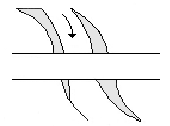Practice Test: Question Set - 02
1. In direct method of contouring, the process of locating or identifying points lying on a contour is called
- (A) Ranging
- (B) Centring
- (C) Horizontal
control
- (D) Vertical
control
2. The Random errors tend to accumulate proportionally to
- (A) Numbers of
operations involved
- (B) Reciprocal
of operations involved
- (C) Square
root of the number of operation involved
- (D) Cube
root of the number of operation involved
3. The conventional sign shown in below figure represents a
- (A) Road
bridge
- (B) Railway
bridge
- (C) Canal
bridge
- (D) Aquaduct
4. Pick up the incorrect statement from the following:
- (A) While
measuring a distance with a tape of length 100.005 m, the distance to be
increasing by 0.005 m for each tape length
- (B) An increase
in temperature causes a tape to increase in length and the measured distance is
too large
- (C) The
straight distance between end points of a suspended tape is reduced by an
amount called the sag correction
- (D) A 100 m tape
of cross section 10 mm × 0.25 mm stretches about 10 mm under 5 kg pull
5. For the construction of highway (or railway)
- (A) Longitudinal
sections are required
- (B) Cross
sections are required
- (C) Both
longitudinal and cross sections are required
- (D) None of
these
6. Detailed plotting is generally done by
- (A) Radiation
- (B) Traversing
- (C) Resection
- (D) All of the
above
7. If the smallest division of a vernier is longer than the smallest division of its primary scale, the vernier is known as
- (A) Direct
vernier
- (B) Double
vernier
- (C) Retrograde
vernier
- (D) Simple
vernier
8. The method of reversal
- (A) Is
usually directed to examine whether a certain part is truly parallel or
perpendicular to another
- (B) Makes the
erroneous relationship between parts evident
- (C) Both (a) and
(b)
- (D) Neither (a)
nor (b)
9. The line normal to the plumb line is known as
- (A) Horizontal
line
- (B) Level line
- (C) Datum line
- (D) Vertical
line
10. In levelling operation
- (A) When
the instrument is being shifted, the staff must not be moved
- (B) When the
staff is being carried forward, the instrument must remain stationary
- (C) Both (a) and
(b)
- (D) Neither (a)
nor (b)
11. The two point problem and three point problems are methods of
- (A) Resection
- (B) Orientation
- (C) Traversing
- (D) Resection and
orientation
12. Ramsden eye-piece consists of
- (A) Two
convex lenses short distance apart
- (B) Two concave
lenses short distance apart
- (C) One convex
lens and one concave lens short distance apart
- (D) Two
Plano-convex lenses short distance apart, with the convex surfaces facing each
other
13. The line of sight is kept as high above ground surface as possible to minimise the error in the observed angles due to
- (A) Shimmering
- (B) Horizontal
refraction
- (C) Vertical
refraction
- (D) Both
shimmering and horizontal refraction
14. If ‘I’ is the stadia distance, ‘f’ is the focal length and ‘d’ is the distance between the objective and vertical axis of the techeometer, the multiplying constant, is
- (A) f/i
- (B) i/f
- (C) (f + d)
- (D) f/d
15. The desired sensitivity of a bubble tube with 2 mm divisions is 30". The radius of the bubble tube should be
- (A) 13.75 m
- (B) 3.44 m
- (C) 1375 m
- (D) None of
these
Next Tests:

